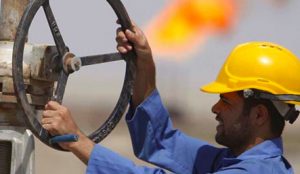By Libya Herald reporter.

Alexandria, 17 November 2017:
The three-cornered standoff between the National Oil Corporation (NOC), Wintershall oil company and locals in the oil crescent town of Jakharra has hardened with threats from elders and other community leaders from across Cyrenaica to shut down all fields in the region and close the oil terminals from Sidra to Tobruk.
At a meeting in Jakharra on Wednesday they gave the various authorities in Tripoli two months to comply with a number of demands, otherwise eastern production and exports would be blocked
The demands are:
- The return of the NOC to Benghazi;
- The relocation of the Central Bank of Libya to Benghazi;
- The return of all other organisations’ headquarters to Benghazi, such as Libyan Airlines;
- The inclusion in the new constitution of special rights for towns and communities in oil producing areas.
It is not known if the elders had the support of the head of the Libyan National Army (LNA), Field Marshal Khalifa Hafter, when making their threat, or of House of Representatives President Ageela Saleh. Without their backing, the threats would be simply symbolic, but meaningless.
The Cyrenaica elders and community leaders had gathered in Jakharra to support it in its clash with the NOC and Wintershall.
The town, an oil production and pipeline hub, has for some time been issuing its demands to both for more jobs in the oil industry. Local officials also complained about pollution from burning off gas and want better medical services in the area. They say local people gain no benefit from the presence of the oil industry.
At the end of last month, there were fresh protests over the demands. These were directed mainly at NOC, with complaints that promises made by NOC chairman Mustapha Sanalla when he visited the Winteshall’s Jakharra operations on 15 June had failed to materialise. Nonetheless, it led to Wintershall stopping production at the Sara oilfield. According to NOC, this reduced national output by 50,000 barrels of oil a day. NOC’s chairman Mustafa Sanalla angrily accused Wintershall of not consulting with it about the closure, saying that it was costing the country $3 million a day.
NOC and Wintershall already had their own dispute over the former’s demand that the German oil company convert its exploration and production agreement to the same as those with all the other foreign companies operating in Libya. As a result, Wintershall had stopped all production earlier this year but an interim deal last June allowed it to resume – until, in the Sara field’s case, it stopped at the beginning of the month.
Subsequently, Jakharra elders said they wanted the concession taken away from Wintershall. They also said that the field would not be allowed to reopen until their grievances and demands were met.
A few days after the closure, a fresh visit by Sanalla to the area to discuss the issues at stake with local officials and leaders appeared to have backfired with the latter indicating that in future they would work solely with the eastern-based, parallel NOC.
This then led to the elders from across Cyrenaica going to Jakharra on Wednesday in an act of solidarity although, instead of simply backing the locals’ demands, they upped the stakes with the threat of an oil blockade if their own additional ones were not met.
Wintershall’s Sara operations, they also added, would not be allowed to resume until all were met.
A fresh eastern oil blockade would be disastrous for Libya’s already crippled economy.
In July 2016, a month and a half before the LNA finally retook the Ras Lanuf, Sidra and Zuwaitia oil terminals from former Petroleum Facilities Guard commander Ibrahim Jadhran, Sanalla claimed that the three-year oil blockade mounted by Jadhran had cost Libya over $100 billion in lost revenue.
That was without the Hariga terminal in Tobruk being affected.







